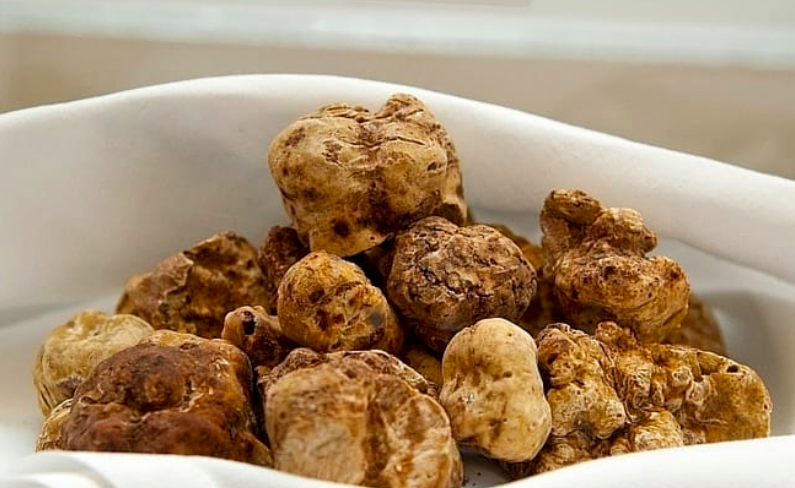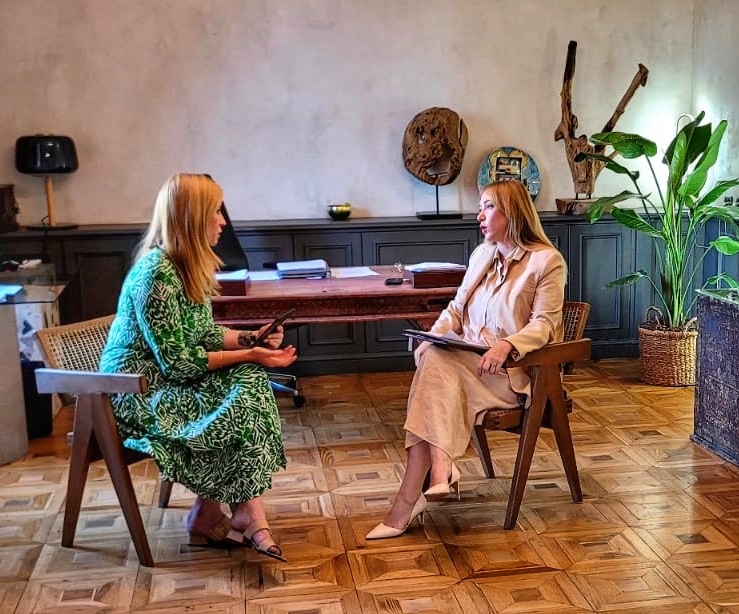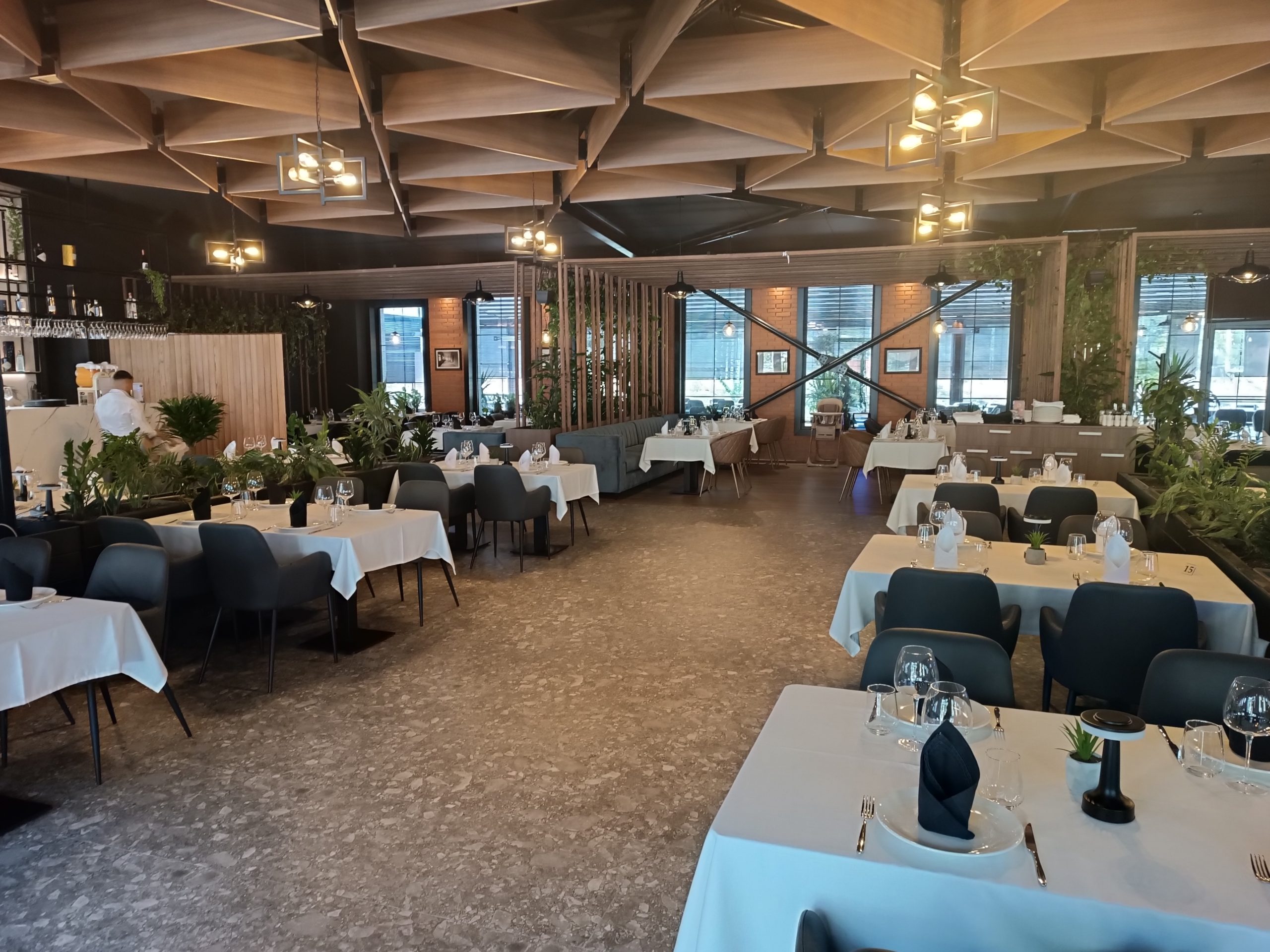William Makepeace Thackeray once described truffles as “something musky, fiery, savoury, mysterious- a hot drowsy smell that lulls the sense and yet enflames them.”
You may think these words are a little ostentatious for what is essentially a subterranean Ascomycete fungus, but if you have been lucky enough to experience their powerful yet delicate, buttery, earthiness, you will know that they are rather exact.
Truffles are a type of tuber and are found predominantly in close proximity to tree roots, particularly those of the hazelnut and oak tree. Growing underground and out of sight, they are rare and hard to find, resulting in them being highly sought after as well as commanding rather lofty prices. French chef Jean Anthelme Brillat-Savarin famously referred to truffles as “the diamond of the kitchen” and with the rare white truffles going for somewhere in the region of EUR 2000 per kilo, it is not hard to see how this comparison was made.
Black truffles and summer truffles are the most common, with white truffles being the most sought after as well as supposedly having the strongest and most unique flavour. Typically, truffles prefer Mediterranean soil and climates and grow plentifully in France, Spain, Italy, the UK, and Albania. Having loved their flavour for many years, I was happy to notice a truffle shop opposite my house, so I decided to pay them a visit to find out more.
https://www.instagram.com/p/BT9ea-DFZsA/?taken-by=tartufshop
‘Tartuf Shop’ has been open for around 18 months, but the Ristani story with truffles spans over a decade. Ylli Ristani had always loved the outdoors- setting off into the countryside with his dogs to hunt, forage, and enjoy being outside, he always had a deep affiliation with nature and what it could offer. He had never considered the possibility of truffles, and in fact, he was not aware that such a thing grew within the roots of Albanian trees until one day, his brother- a chef in the UK- suggested he try looking for them.
Ylli was not particularly convinced that anything would come of his truffle hunt but he set off in earnest nonetheless, armed with a spade and his dog, to see what he could find. His first searches were completely truffle-less, but he persevered until one day, he unearthed a small brown, gnarled, fungus and he realised he had struck lucky.
https://www.instagram.com/p/BbRobwaljWq/?taken-by=tartufshop
Over the years he has honed his search, using tried and tested techniques, as well as continually training his pack of truffle-hunting dogs to sniff out the prized-tubers from as far as 200m. But Ylli also feels like he helps to conserve the environment as well.
His daughter Frensis explains;
“Now people know that truffles are worth a lot of money they are going to try and find them without understanding how to do it. They go with the axe and hack at the roots of the trees, damaging them in the process. If they damage the roots of the trees, no more truffles will grow there. They are damaging the industry.”
At the moment there are no laws that specifically protect trees when it comes to truffle hunting, and in Divjake-Karavasta Park, the situation is becoming desperate. Forestry worker, Agi Hoxha stated that without rules, it is very difficult to stop people from hacking at the trees and causing damage that lasts generations. Furthermore, the Albanian industry needs to be protected from individuals coming from Italy, Greece, Romania, and France who pillage the land for truffles and smuggle them abroad where they can be sold for three or four times the price.
https://www.instagram.com/p/BhJG43BBdOs/?taken-by=tartufshop
The Tartuf Shop not only sells fresh truffles they have gathered themselves, but they also sell truffles purchased from other truffle-hunters, as long as they know they were harvested ethically. Frensis is keen to point out that they do everything above board- from taking care of the areas where they gather the truffles, to paying all of their taxes and dues on the sale of the items. The Ristani family then sell these truffles to restaurants throughout Albania as well as exporting them to Italy where they then end up on some of the world’s fanciest dinner plates, even ending up as far afield as ‘Noma’ in Copenhagen. Whilst some of these nuggets can go for small fortunes, it doesn’t mean the Ristani’s are rich- after buying up local truffles, paying tax and rent, and taking care of their prized truffle-snuffling dogs, there is not much left- this is a path trodden because of love, not money.
“What’s special about Albanian truffles?” I ask Francis. She laughs and explains that many people, not just Albanians, have said that Albanian truffles have a very special quality about them. She tells me that they say the flavour is stronger and richer, and she puts this down to the clean air, unspoiled lands, and fertile soil that is so prevalent in this country.
https://www.instagram.com/p/Bn3tJpWh7gb/?taken-by=tartufshop
As well as local truffles, Tartuf Shop sells a range of other truffle-flavoured products including sauces, oils, salts, and even honey- all laced with white or black truffle shavings. As you walk into the shop, the smell is quite overpowering but in the most wonderful way.
Truffles grow throughout Albania, from Shkodra, to Dajti, to the treacherous peaks of Llogora Pass, but finding them is not an easy task. Frensis explains that her father can go for days and weeks without finding one single truffle and that the search for these elusive treats can at times be dangerous.
Due to the high value of these items, competition and ‘turf wars’ can be common. Not only do people come and poach and pillage as well as threaten other truffle hunters, but there are also natural threats such as venomous snakes to look out for as well.
Truffle hunter, Evgjeni Pano describes dicey turf-wars across the countries forests where groups of men regularly threaten peaceful truffle hunters in an attempt to scare them away from lucrative hunting grounds. This did little to put her off, however, as a deep love for her work ensures she will return again and again. The same cannot be said for Besmi Lami who previously spent his days scouring the forests of Dajti mountain in search of bounty. Late last year, his two prized and loved truffle-hunting dogs were poisoned by competitors in a ruthless attempt to stop his work.
“They followed me, found the place where I foraged and then killed my two dogs to stop me from coming back,” he said.
Early starts, long days, bad weather, the potential threats-the life of a truffle-hunter is not a glamorous one but danger aside, it is one that gives Yili and his family a lot of happiness.
https://www.instagram.com/p/BoHAC-IhCZj/?taken-by=thebalkanista
As I get up to leave, Gjystina Ristani stops me and presses a small package into my hand. Within the layers of tissue nestle two small, black truffles- their pungent aroma wafts into my nostrils and makes my stomach rumble. After being armed with full instructions on how to cook them, I make my way home, excited to experiment with my new acquisition.
After washing them gently and patting them dry with tissue as instructed by Gjystina, I sliced them carefully into thin slivers and mixed them into a sauce consisting of cream, mushrooms, and a splash of olive oil. After simmering the mixture for around 7 minutes, I mixed in some locally bought fresh, wholewheat pasta and served it up with a dash of black pepper. The dish smelled like you would expect a truffle-laced dish to smell, distinctly truffley but the flavour really was something else. Black truffles are said to have a weaker flavour than their white counterparts, but their powerful, pungent earthiness was something to savour. I think Frensis was right when she told me that there is something a bit special about Albanian truffles!
I love the fact that such a luxurious and highly prized item grows in abundance in this country, although it does not surprise me. With such diverse flora and fauna, set against an incredibly beautiful backdrop, It seems almost obvious that such a wonderful thing could be found just below the surface. I hope that the Albanian truffle industry can continue to thrive without people taking advantage of it, or the truffles environment being compromised or destroyed.
Well done to the Ristani family for bringing some semblance of order to a chaotic and currently lawless industry, and my thanks to them for allowing me to ask them 101 questions about truffles and all things truffle-related!
Follow The Balkanista!


